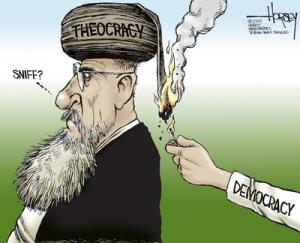- MENU
- HOME
- SEARCH
- WORLD
- MAIN
- AFRICA
- ASIA
- BALKANS
- EUROPE
- LATIN AMERICA
- MIDDLE EAST
- United Kingdom
- United States
- Argentina
- Australia
- Austria
- Benelux
- Brazil
- Canada
- China
- France
- Germany
- Greece
- Hungary
- India
- Indonesia
- Ireland
- Israel
- Italy
- Japan
- Korea
- Mexico
- New Zealand
- Pakistan
- Philippines
- Poland
- Russia
- South Africa
- Spain
- Taiwan
- Turkey
- USA
- BUSINESS
- WEALTH
- STOCKS
- TECH
- HEALTH
- LIFESTYLE
- ENTERTAINMENT
- SPORTS
- RSS
- iHaveNet.com
by William Pfaff

The truly significant result of the suppressed Iranian revolt is that the most important Islamist radical movement in the contemporary world has demonstrated that it has become a brutally repressive dictatorship whose leaders rig elections and beat down clear popular demands for a true election count or repeat of the election itself.
This affair has nothing to do with the alleged war of civilizations or the machinations of the American Great Satan, or of the hereditary enemy of Iran, the British Empire.
It is the consequence of the abuse of power by leaders who established a new form of religious republic, meant to combine what they believe God's law, as set forth in the Quran, with the exigencies of modern politics and power, among them nuclear power, leading toward nuclear weapons to deter enemy Israel and Infidel America.
Iran has made itself the leading Islamic state in the Middle East, a republic standing alongside the traditional Muslim monarchies of Jordan, Morocco and Saudi Arabia. It was meant as a model of Muslim self-liberation from foreign oppressors.
It had been an exemplar in both 1951 and 1979 of popular uprising against Western domination, and subsequently of the installation of a modern Islamic form of government with a democratic substructure, controlled within clerical institutions, with a clerical Supreme Leader who spoke the divinely inspired final word on government decisions.
This government now stands discredited internationally, as well as in the eyes of what clearly seems the majority of Iranians, who are ruled today by a massive deployment of police power for the sake of unaccountable personal or clan advantage of the leadership.
They, and Muslims in general, should learn from this that the enemies are not all without -- they are also within the Islamic world.
The Iranians have been revolutionaries twice in modern times, both times eventually submitting to foreign power. This time it is Iranian and Islamic power that abuses them, not foreign oppressors. Could they successfully revolt once more, against domestic tyranny? Or does the revolt still go on?
The first rebellion followed World War II occupation by Britain and the Soviet Union, followed by an attempt by the U.S.S.R to set up a Soviet-controlled splinter state in the north. However, Iran's constitutional movement goes back to the start of the 20th century, and the Shah at that time accepted a constitution and parliament in 1906. However, the country was divided into Czarist and British spheres of influence, and the United States took over from both after the Second World War.
In 1945, the national movement was led by a veteran pre-war parliamentarian, Muhammad Mossadegh, who demanded nationalization of the British-owned Anglo-Iranian Oil Company.
When parliament voted the nationalization, the Shah was compelled to name Mossadegh prime minister. But Mossadegh's resistance to the terms demanded by Britain led to a political crisis in which the Shah fled the country -- to be brought back and reinstated by the CIA.
Mossadegh was sent to prison for three years of solitary confinement, and then held in house arrest for the remainder of his life.
The Shah encountered the second rebellion 28 years later, the CIA being unable to save him a second time.
The successful Islamic revolt of 1979 installed the Ayatollah Ruhollah Khomeini, and the revolutionaries sacked the U.S. Embassy to boot, successfully holding its members ransom for more than a year.
Why this was allowed to happen remains a mystery. Instead of recognizing the seizure of the embassy as an implicit act of war, and detaining Iranian officials, businessmen and students in the United States for exchange under the auspices of the Red Cross, the Carter administration frantically forced all the Iranians in the country to leave the U.S. as fast as possible. The American embassy staff then endured 444 days imprisonment, and an ill-conceived military rescue fiasco, before the Iranians triumphantly handed them over to Ronald Reagan.
The admirable Lebanese editor and commentator Rami G. Khouri, has just written that ordinary Arabs elsewhere, living under autocratic and potentially vulnerable leaders of their own, have watched this Iranian uprising with "forlorn envy."
Why forlorn? What stops them from their own revolts, if that is what they want?
The Pakistan tribesmen of the Swat Valley, and elsewhere in the country's northwest territories, are even now fighting to expel Taliban intruders.
The Iranian revolt may not be over. But even if it is, Iranians will one day surely try again.
The Iraqis, whose nation seems approaching another sectarian or ethnic precipice, could, if they had wanted, have saved themselves much and misery by rebelling against Saddam Hussein themselves, as they had done against previous unwanted rulers.
People must make their own decisions. If not, they risk getting the governments, or the liberators, they deserve.
WORLD | AFRICA | ASIA | EUROPE | LATIN AMERICA | MIDDLE EAST | UNITED STATES | ECONOMICS | EDUCATION | ENVIRONMENT | FOREIGN POLICY | POLITICS
As Iranians Revolt, Their Government Reveals True Self